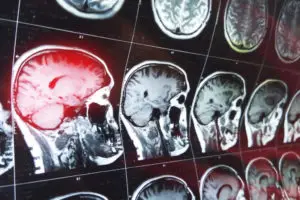
 People suffer from brain injuries due to a variety of reasons. Medical experts generally divide brain injuries into two categories. First, a brain injury can result from a hereditary, congenital, degenerative, or birth-induced condition. Second, an individual may suffer from an acquired brain injury (ABI), which occurs after birth. For instance, an individual might suffer injury to their brain due to a fall, an accident, or a stroke.
People suffer from brain injuries due to a variety of reasons. Medical experts generally divide brain injuries into two categories. First, a brain injury can result from a hereditary, congenital, degenerative, or birth-induced condition. Second, an individual may suffer from an acquired brain injury (ABI), which occurs after birth. For instance, an individual might suffer injury to their brain due to a fall, an accident, or a stroke.
Experts further break down ABIs into two types of injuries—a traumatic brain injury (TBI) and a non-traumatic brain injury (NTBI). TBIs happen from direct impacts to the head, such as those in a traffic collision, a fall, or an assault. NTBIs result from internal factors negatively impacting the brain, such as a stroke, exposure to a virus or poison, or a tumor.
Brain injuries can happen anywhere, but some environments (e.g., nursing homes) or situational factors (e.g., a motorcycle accident) can increase your risk of suffering an injury to the brain.
Nursing Home Negligence
Families often turn to elderly care centers to provide specialized around-the-clock attention to their aging loved ones. Unfortunately, nursing home residents can suffer from brain injuries due to slip and fall accidents, especially when entering or exiting a shower due to the wet surface; attempting to dress, undress, or use the bathroom without assistance; or simply walking unaided and losing balance.
While the incidents mentioned above are often faultless, brain injuries also happen due to nursing home neglect, such as failing to correct or secure tripping hazards on the premises. Additionally, nursing home management might hire distracted staff members who improperly medicate elderly residents. They may neglect to conduct thorough background checks on care providers who later engage in physical violence toward elderly residents, causing subsequent head trauma or brain injury.
Regardless of its root cause, elderly residents in nursing homes can suffer from the following brain injuries:
- Concussion – This occurs when the brain is jarred back-and-forth against the skull due to a severe head impact. A concussion can cause significant loss of function and may even be fatal if complications such as blood clots occur.
- Contusion – This occurs when a head impact bruises the brain tissue. While the effect of a contusion is typically less severe than that of a concussion, a contusion can cause disorientation, emotional changes, and a decreased flow of oxygen to the brain.
- Diffuse axonal injury – This occurs when a fall, abuse, or other impact causes damage to the brain’s white matter. Unlike a concussion, the brain does not move in a diffuse axonal injury. Instead, brain cells are damaged. This type of brain injury is one of the more dangerous ones because it is invisible, often leading to unconsciousness or a vegetative state with little to no warning.
Expect More, Receive More: Legal Support That Feels Like Family
Motorcycle Accidents
Compared to their car-driving counterparts, motorcycle drivers are sixteen times more like to suffer from a fatal injury, including head and brain injuries, in an accident. Motorcycle drivers who sustain an impact on their head during an accident encounter one of three TBI types of brain injuries.
First, a motorcycle driver may suffer from a mild TBI where they maintain an awareness of their surroundings during the accident. At most, a concussion occurs. The second degree is a moderate TBI where a motorcycle driver loses consciousness temporarily, lasting a few hours at the most. The motorcycle driver may experience cognitive lapses and behavioral impairments. Lastly, and most dangerous, a motorcycle driver may suffer from a severe TBI. A severe TBI often leads to a permanent loss of abilities, the onset of depression, and a comatose state lasting for weeks or longer.
What Types of Motorcycle Accidents Cause Brain Injuries?
Motorcycle accidents that can lead to a TBI do not need to involve another vehicle. Motorcyclists can sometimes lose balance and control of their motorcycle due to poor weather. They might also strike a stationary object, such as a tree or highway divider, or fall prey to other road conditions that cause an accident. Failure to wear a helmet can intensify resulting head and brain injuries or make an injury to the head and brain more likely.
Contrarily, another person’s negligence can also cause a motorcycle accident that results in a brain injury. For instance, a car driver might strike a motorcyclist, throwing the motorcycle driver from their bike. Even when a motorcyclist wears a helmet, malfunctions or damage to the helmet can occur, especially upon impact, leaving the motorcyclist’s head and brain exposed, unprotected, and vulnerable to injury.
Whether a TBI results from a faulty motorcycle helmet or an inattentive car driver, motorcyclists commonly face the following types of brain injuries:
- Subdural hematoma – This occurs when multiple blood vessels within the brain rupture due to a severe impact. Following the rupture, blood builds up in the brain and can result in death due to compression of the brain.
- Coup-contrecoup injury – This occurs when one side of the head faces impact, yet the opposite side of the head suffers from damage. This bait-and-switch type of injury happens due to the brain shifting during impact, subsequently striking the inside of the skull.
- Epidural hematoma – This occurs when the impact to the head causes a tear to the middle meningeal artery within the brain. The resulting blood leak can lead to an accident victim losing his or her vision, speech, and mobility.
Slip and Fall Accidents

Marcus W Viles, Brain Injury Attorney
Individuals can suffer injuries from a slip and fall accident while engaging in everyday activities. A slip and fall might occur in a grocery store where liquids, spoiled food, and inoperable shopping carts can cause accidents. Similarly, restaurants, movie theaters, and other businesses might be prone to premises liability claims resulting from slip and fall accidents.
Claimants who suffer from a slip and fall often encounter the following types of brain injuries:
- Closed head injury – This occurs when an impact injures the brain but leaves the skull intact. The effects include pressure in the brain and swollen blood vessels.
- Concussion – This occurs when the head and brain receive a blow during a fall. Symptoms of a concussion include dizziness, slurred speech, decreased concentration, and ringing in the ears.
Regardless of how your brain injury happens, you might be eligible to receive compensation to help pay for the costs of your medical bills or pain and suffering. Contact a reputable law firm to learn about your legal rights and remedies.




